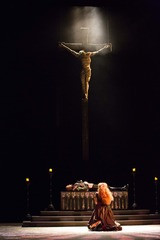|
Back
Upholding Respectability and Tradition Atlanta
Cobb Energy Performing Arts Centre
03/08/2014 - and 11*, 14, 16 March 2014
Charles Gounod: Faust
Noah Stewart (Faust), Mary Dunleavy (Marguerite), Alexander Vinogradov (Méphistophélès), Emily Fons (Siébel), Edward Parks (Valentin), Cory Neal Schantz (Wagner), Robynne Redmon (Martha Schwerlein)
Atlanta Opera Chorus, Walter Huff (Chorus Master), Atlanta Opera Orchestra, Peter Ciaschini (Concertmaster), Arthur Fagan (Conductor)
Louisa Muller (Stage Director), Earl Staley (Scenic Designer), Joanna Schmink (Costume Coordinator), Marie Barrett (Lighting Designer), Richard Jarvie (Wig and Makeup Designer)

(© Jeff Roffman)
Charles Gounod’s Faust could arguably be classified as the quintessential French grand opéra of the mid-19th century, and Atlanta Opera does an exceptionally fine job in upholding this claim. This is first evidenced by Arthur Fagan’s nearly flawless delivery from the pit, moving the tempo with genuine politesse respectable in honor of the composer’s wishes; tonality and orchestral coloring enriches an already mellifluous score.
Earl Staley unveils a rich selection of props and sets that extend into period appropriate costuming, compliments of Joanna Schmink. Act III has a great amount of ‘layering’ of the woodland setting, adding depth to the stage and Marguerite’s garden. Spring must have arrived early in Atlanta for a profusion of colorful flowers blankets the cottage even though the stone and plants look a bit garish. Marie Barrett has a wonderful pallet of lighting (having personally witnessed her expertise in other opera productions.) The sets veer away from the traditional vein after Act IV, Scene II, turning more minimal and stark. This puts more focus on the internal psychological torments haunting the three principals. This particular stretch of the opera is pronounced with accentuations by Barrett that make the stage exponentially come to life; the church interior with Jesus on the cross is especially breathtaking.
Perhaps the most difficult of all roles within Faust is that of Marguerite. Mary Dunleavy has the technical and physical ability to leap across gyrating vocal boundaries as the opera deepens. Having first encountered Ms. Dunleavy in Zemlinsky’s Der Zwerg (Read here) in Los Angeles, her acting and creamy soprano register was ravishing. Six years later, she hasn’t lost her edge for character portrayal or lyrical charm. Her introductory number of Act III (“The Ballad of the King of Thule”) is expressively plaintive; “The Jewel Song”, a requisite for any aspiring coloratura singer, shows her gesticulations picture perfect, her delivery substantive yet the voice doesn’t carry forth sufficient convivial bounciness, nor are her trills particularly polished. Where Ms. Dunleavy really begins to excel, however, are in ensuing dramatic sequences. There’s an uncanny resemblance in musical outpouring to that of Natalie Dessay during the vilifications stemming from Valentin. Her final acrobatics entering eternal salvation are captivating. One can’t help but have tremendous pathos for the condemned mortal.

(© Jeff Roffman)
Noah Stewart (Faust) has a marvelous stage presence. The tenor flows through the music like a soft-edged knife through butter. The love duet with Marguerite (ending Act III) is wrapped up in a beautiful blend of two voices that is accompanied by Fagan’s case-sensitive orchestra; the moment is enriching.
New to the Atlanta Opera stage is Alexander Vinogradov as Méphistophélès. His baritone register is resolute, able to reach lower notes and attain a bit of grit. The timbre is lighter in comparison to others, and he maintains the buffo quality that adds a bit of relief to an already hefty subject. Slipping into the trouser role of Siébel, Emily Fons shines with a pop, winnows through her notes with an upbeat, animated freshness; her “Flower Song” is a real charmer. Similar to Vinogradov, Robynne Redmon returns to Atlanta Opera in the role of Martha Schwerlein. She is perfectly suited for her role, doesn’t overstate her character. The repartee with Méphistophélès is respectfully humorous.
Both physically and vocally Edward Parks has this certain sense of machismo virility. His projection is clear and unwavering, but clearly he’s better suited singing Valentin’s notes in the mid to upper range; the lower notes get a bit lost inside the orchestral carriage.
On a celebratory note, this Faust production is dedicated to Chorus Master Walter Huff who has served for 25 years with the Atlanta Opera. Having garnered a distinguished resumé, he builds upon that dossier with another fine delivery from his choral members. Particularly poignant is the men’s “Gloire immortelle” that runs along like a musical Swiss clock... impeccable precision. Blocking in the “Waltz” is a bit unimaginative and torpid.
Louisa Muller is credited with this production’s stage direction. The vision is limpid, factoring in modern day relevancy while bathed in an enclave of respectful tradition. Charles Gounod, indeed, is smiling.
Christie Grimstad
|